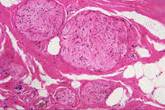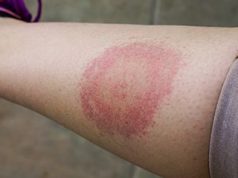Study in rhesus macaques indicates causal role for inflammation in Lyme neuroborreliosis
THURSDAY, April 16, 2015 (HealthDay News) — Anti-inflammatories may help prevent many neuropathologic effects of Lyme neuroborreliosis, according to an experimental study published online April 16 in The American Journal of Pathology.
In an effort to identify the causal role for inflammation in Lyme neuroborreliosis, Geeta Ramesh, Ph.D., from the Tulane National Primate Research Center in Covington, La., and colleagues examined the induced inflammatory changes in the central nervous system, spinal nerves, and dorsal root ganglia of rhesus macaques. The rhesus macaques were inoculated intrathecally with live Borrelia burgdorferi and treated with the anti-inflammatory agents dexamethasone or meloxicam or left untreated.
The researchers identified significantly elevated levels of interleukin-6, interleukin-8, chemokine ligand 2, and CXCL13 and pleocytosis in enzyme-linked immunosorbent assay of cerebrospinal fluid of infected animals, but not dexamethasone-treated animals. Regardless of treatment, cerebrospinal fluid and central nervous system tissues of infected animals were culture positive for B. burgdorferi. In immunofluorescence staining and confocal microscopy, B. burgdorferi antigen was detected in the dorsal root ganglia and dorsal roots. Histological changes seen in the central nervous system, cervical spinal cord, spinal roots, and dorsal root ganglia were absent in dexamethasone-treated animals. A few infected animals exhibited persistent abnormalities in F-wave chronodispersion in nerve roots; these abnormalities were absent in dexamethasone-treated animals.
“Our results suggest that ongoing cytokine activation in the nervous system can contribute to the persistent symptoms of fatigue, pain, and cognitive dysfunction that patients sometimes experience despite having been treated for Lyme disease,” Mario T. Philipp, Ph.D., a professor of microbiology and immunology and chair of the Division of Bacteriology and Parasitology at the Tulane National Primate Research Center, said in a journal news release.
Copyright © 2015 HealthDay. All rights reserved.








